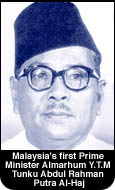|
|

|
 |

 |
31 August 1998
The nation that Tunku Abdul Rahman Putra created in 1957 and enlarged six years later
has endured, as has its reputation.
Malaysians shall always be grateful to him for freeing them from British colonialism,
preventing the nation from being overtaken by the communists, avoiding it being dominated
by a group of ambitious and callous men and averting disintegration by Sukarno's
Indonesia's Confrontation.
 Among the post colonial nation builders surely the Tunku stands
out. Among the post colonial nation builders surely the Tunku stands
out.
If 1970 saw the end of Tunku Abdul Rahman Putra's political career, it also marked
an achievement (of sorts) in Islamic diplomacy. He founded the Organisation of Islamic
Conference (OIC) in Jeddah and became its first secretary-general.
When he returned home in the mid-seventies, he was invited to be chairman of Star
(to avoid a takeover he claimed) and began writing his weekly column.
Though he could not possibly have been described as a journalist per se in the opinion
of some people, his column stood out because it had been based on primary sources
even if it was mainly himself.
How we wish the Tunku had written his autobiography. If he did, it would have been,
I am sure, in every sense his magnum opus.
The "Father of the Nation" - our George Washington - would, on the 41st
anniversary of Merdeka tomorrow, have been 95 years plus had he lived.
The Tunku made more sacrifices than any one else in our struggle for freedom even
though it was a peaceful process.
He led the constitutional struggle with flair and a gift that only he had, accompanied
by many lighter sides and amusing stories and anecdotes. Merdeka cleansed any stains
of his past.
The May 13, 1969, racial incident noticeably affected him and he suffered many in
dignities in silence following his (hastened) retirement.
He,told me during many hours of conversation in early 1980s that he was placed in
a bad light by several people, one or two being important personalities. What hurt
him, he said, was that they knew what they were saying were untrue.
I told him those were the ways of "politics. He agreed, though he did not expect
it to have emanated from where it came.
I always hint in my Utusan Malaysia column (every Monday) that since we do
not seem to have many modern heroes we should foster the memory of the few national
legends we cherish.
One national hero whom the government does not seem to cultivate in image as it does
P. Ramlee (reruns of his movies festivals, exhibitions besides a memorial and more
reruns of his films) is the Tunku.
I am happy that we are remembering and honouring Ramlee but what are we doing to
honour and perpetuate the memory of that man who gave us freedom and identity?
I am well aware of what the government of Prime Minister Datuk Seri Dr Mahathir Mohamad
has done in acknowledgment of the Tunku`s colossal contributions.
The renaming of Universiti Pertanian Malaysia to Universiti Putra Malaysia and calling
the country's mega-modern future administrative centre Putrajaya are proof.
I also know that the Tunku made one or two films, one of which was Mahsuri.
It would be nice if our television stations screen and rescreen them and if museums
and the Memorial Tunku hold exhibitions, talks and seminars on the Tunku's legacy
from time to time.
Malaysia should remember that had the Tunku and Umno (and the Alliance party) not
been so strong and resolute we might have had to wait another ten years before achieving
Merdeka.
Datuk Onn, the British preferred leader, agreed to delay independence by a decade
or more and he lost out.
It was a tragedy that the prince whose reputation for integrity and political skill
was unchallenged for almost two decades, should have left office under circumstances
which Tunku did.
It is well to recall this Kok Lanas truism or folk wisdom that a man's reputation
depends on everything he has done not simply on a particular phase of his career.
|

|
|
|
|